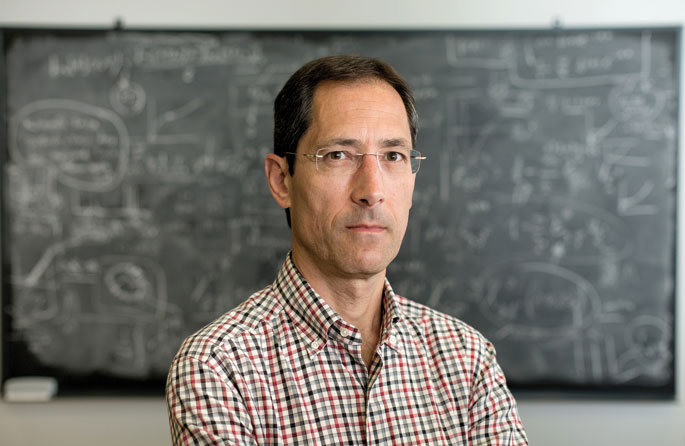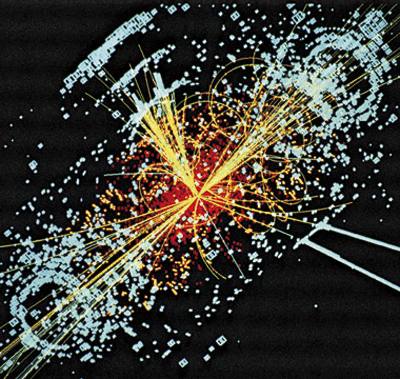"The first thing you need to do science is not to understand anything."
- Ruth Lazkoz (Bilbao, 1971) is dedicated to science, but it is difficult to see a white coat in a laboratory. It belongs to the Theoretical Physics Department of the UPV/EHU and has slate and calculation processors as a daily work tool. The task now in hand is explained in a simple way: Einstein is rewriting his equations to see if dark energy gets well with the new model that's going to get from them. But we have not understood that either.

A century ago, we learned that the universe is expanding constantly, and in the 1990s, we realized that that expansion, in addition, is getting faster and faster, even though our models say otherwise. The responsible person we've called him dark energy, but we don't know what it is. I mean, for the time being, it's just a concept that we've invented to fill the gap in our theory. Have I started well?
In general, yes. Dark energy, or cosmological constant, also known as such, is a simple mathematical concept, but we study, for example, living things, and you get some values and others in other areas of the universe.
And should they be equal?
Of course! There's only one physics, because there's a universe. The problem is that this struggle, to name it in some way, is related to the assumption that there is a cosmological constant. Perhaps if we had a more flexible theoretical model, the forecasts would be closer to the data that we then observed.
The point is that since it was decided that there is something called dark energy, physicists have been working for years, with hardly any of it being clarified.
Yes, it is true. Dark energy is very dark and nothing has advanced, or at least not advanced enough in terms of severe physics.
Stephen Hawking’s latest book, The grand design, 2010, begins by saying that “philosophy has died”...
I do not share this phrase.
In this book, Hawking says that we don't need gods to explain the origin of the universe, that gravity is the cause of the Big Bang. But when you reach that level, is it not lawful to think that gravity is but a name rather of God, or rather of divinity?
But God is a very small part of philosophy. If you want to throw away the things that make you feel uncomfortable, you can't be physical. If you feel more comfortable thinking there is a god, nothing will push you to learn more. “Here is God, don’t look beyond, the rest is hidden and it’s a secret.” From the moment you introduce a God, there is no science anymore. And I don't care whether that God is a being that has the figure of a bearded man or something like that.
However – I am sorry to insist – how should we act, for example, with regard to the so-called singularity that science itself has admitted is beyond its scope, that is, with regard to the previous time of the Big Bang?
With humility. We don't understand it, OK. The first thing you need to do science is not to understand anything.
In any case, does working in cosmology not continually lead you to the great existential questions that we all have in our heads? The Fat: Why is there ‘something’ and not ‘nothing’?
No, I'm more practical. At least the physicists at this school weren't going around that, knowing what was there before the Big Bang, etc. It's true that in the life of a normal physicist, the things at work are constantly around the head; when I'm doing dinner, I remember the latest data coming from the telescope and I call a colleague to comment on some idea about it. But we are not particularly committed to the existential aspect of the issue.
It is estimated that the dark energy referred to above represents about 70 per cent of the total energy of the universe.
Yes, and 25 percent is dark matter. The matter we know is only 4%.
It's not only dark energy, it's also dark matter. What is that?
Nobody knows. But there are theoretical candidates, we've worked here with some models. Particles must be very weak, strange. You can build a mathematical model, predict what your behavior will look like ... The problem is that they have never been detected yet. Anyway, I'm not an expert on that, because it's not my field of work.
All of this reminds me of a phrase from the great physicist Leonard Susskind, which puts today's science and the men of the caves at the same height that they began to ask their first questions about the enigmas of the universe.
I completely agree.
To conclude: your day to day is not just science. Get funding, get projects going... and have to publish something permanently in specialized journals.
I believe that the most serious problem is the evaluation systems of our work. Does anybody publish many articles in journals? Well, let's look at what's wrong, not what's wrong, not what we're highlighting, but what we're failing. That happens every day in the academic world.
“Gaur egun ez dago duela mende batekoak bezain fisikari ospetsurik (Einstein, Bohr, Schrödinger...), Stephen Hawking izan ezik agian. Esaten da hamarkadak daramatzagula fisikan aurrerapauso handirik egin gabe, baina orain gutxi egin da grabitate-uhinen aurkikuntza, eta hori arrakasta handia izan da. Uste dut fisikaren aro hau datuen aroa modura gogoratuko dela zientziaren historian; ezagutza asko zabaldu da eta jada ez da hain kontu elitista. Lehen fisikari gutxiago zegoen, eta alde handiagoa zegoen nabarmentzen zirenen eta gainerakoen artean”.
Grabitazio uhinen aurkikuntzak aro berri bat irekiko du gure unibertsoaren ezagutzan. Izan ere, grabitazio uhinei esker unibertsoaren iraganeko bilakaera ezagutu ahalko dute ikerlariek.
On 11 March, four years will come after the explosion of the Fukushima nuclear power plant in Japan. Researchers agree that this is the most polluting nuclear accident in history, but they do not agree on the consequences it will have. Assessing the consequences so far is... [+]
1964. urtean Higgs bosoien teoria plazaratu zen: unibertsoko partikula guztiek masa zergatik zuten azaldu nahi zuen. Sen onari erantzuten zion eta beste edozein teoriak baino probabilitate haundiagoak zituen egia izateko, baino 2012rarte ez zen frogatzerik izan.
Zientzia eta guda gizonezkoen alor esklusiboak ziren XX. mendearen hasieran. Espresuki debekatuak zitzaizkien emakumezkoei, neskametzarako edo gizasemeen menpeko lan anonimoetarako ez bazen behintzat.
Stephen Hawking fisikariak boikot akademikoa egingo dio Israeli, bertako presidente Shimon Peresen omenez egingo den ospakizunera joateko gonbidapena ukatuz. Gutun baten bidez eman du erabakiaren berri, Israelek palestinarrei emandako tratua gaitzetsi asmoz, The Guardianek... [+]
Last year, CERN announced that it had located neutrinos that moved at a faster rate than light, but it was subsequently shown that the origin of the alleged finding was nothing more than a poorly made measurement. After that failure, there comes the finding of the particle that... [+]
CERN laborategiko zientzialariek Higgsen bosoia izan daitekeen partikula aurkitu dutela iragarri dute gaur goizean. 1960ko hamarkadan Peter Higgs fisikari britainiarrak esan zuen partikula elementalen artean beste guztien jatorria izango zen partikula bat existitu behar zela,... [+]
Azken hamarkada bitan, materia atomoz atomo eta molekulaz molekula manipulatzeko gaitasuna garatu dugu gizakiok. Hartara, gauzatu egin da 1950eko hamarkadan Richard Feynman fisikari ospetsuak irudikatutakoa, berak izen hori eman ez bazion ere: nanoteknologia. Aukera berrien... [+]

























